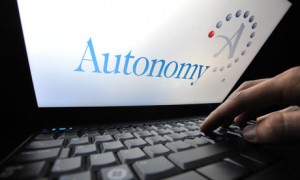HP is planning to “aggressively” seek recompense for alleged accounting fraud related to the acquisition of its Autonomy unit, which resulted in the vendor taking a non-cash impairment charge of US$8.8 billion.
HP acquired Autonomy in 2011 for $10.3 billion under the leadership of then-CEO Leo Apotheker, who was ousted after a short and tumultuous run at the troubled company. On Tuesday, HP said an internal investigation has found Autonomy was “substantially overvalued at the time of its acquisition due to the misstatement of Autonomy’s financial performance, including its revenue, core growth rate and gross margins, and the misrepresentation of its business mix.”
HP had been roundly criticised by observers who believed it had paid far too high a price for Autonomy.
An unnamed “senior member of Autonomy’s leadership team” came forward after Autonomy’s founder, Mike Lynch, left HP earlier this year, and alleged “that there had been a series of questionable accounting and business practices at Autonomy prior to the acquisition by HP,” according to a statement. “This individual provided numerous details about which HP previously had no knowledge or visibility.”
The alleged wrongdoing appears “to have been a wilful effort to mislead investors and potential buyers, and severely impacted HP management’s ability to fairly value Autonomy at the time of the deal,” HP added.
More than $5 billion of the charge was related to these alleged improprieties, with the rest tied to HP’s stock value and market conditions, according to the statement.
HP has referred the matter to the U.S. Securities and Exchange Commission’s enforcement division, as well as the U.K.’s Serious Fraud Office.
After the whistleblower came forward, HP launched its own “intense” investigation, which is ongoing, the company said. This included a forensic review of Autonomy’s books by PricewaterhouseCoopers.
Apart from the SEC and Fraud Office investigations, “HP is preparing to seek redress against various parties in the appropriate civil courts to recoup what it can for its shareholders,” according to the statement.
It’s not clear when HP will actually file suit, or against whom.
“This will take a long time to work through, but we’re committed to seeking redress,” CEO Meg Whitman said during a conference call Tuesday. “I’m expecting this is going to be a multi-year journey through the courts.”
It also wasn’t clear whether any executives remaining at HP will suffer consequences for the alleged fraud.
“The two people who should have been held responsible are gone,” Whitman said, referring to Apotheker and HP’s former chief strategy officer, Shane Robison. “That’s the way I see it right now. I feel good about the stability of leadership.”
“With regard to the board, most of us were here and voted for [the acquisition], and we feel terrible about it,” Whitman added. But HP relied on Autonomy financial documents that had been audited by Deloitte. “In the end, you have to rely on audited financials, and we did.”
However, HP has changed the way it conducts mergers and acquisitions, according to Whitman. “Due diligence now reports to the CFO,” she said. “At the time, due diligence and M&A reported to strategy instead of the CFO. I’ve never seen that before and it’s a change I made right away.”
Apotheker, Robison and Lynch couldn’t immediately be reached for comment. Lynch was reviewing HP’s announcement on Tuesday and is planning to make a statement, according to one published report.
Autonomy was supposed to kick-start HP’s push into enterprise software, which can be more profitable than servers, PCs and services. The company’s software focuses on data management, search and archiving, with its core product being the IDOL (Intelligent Data Operating Layer) Server.
But HP’s probe turned up a “mischaracterisation of revenue from negative-margin, low-end hardware sales with little or no associated software content as ‘IDOL product,’ and the improper inclusion of such revenue as ‘license revenue’ for purposes of the organic and IDOL growth calculations,” according to its statement. “This negative-margin, low-end hardware is estimated to have comprised 10-15% of Autonomy’s revenue.”
In addition, Autonomy allegedly used “licensing transactions with value-added resellers to inappropriately accelerate revenue recognition, or worse, create revenue where no end-user customer existed at the time of sale,” HP said.






